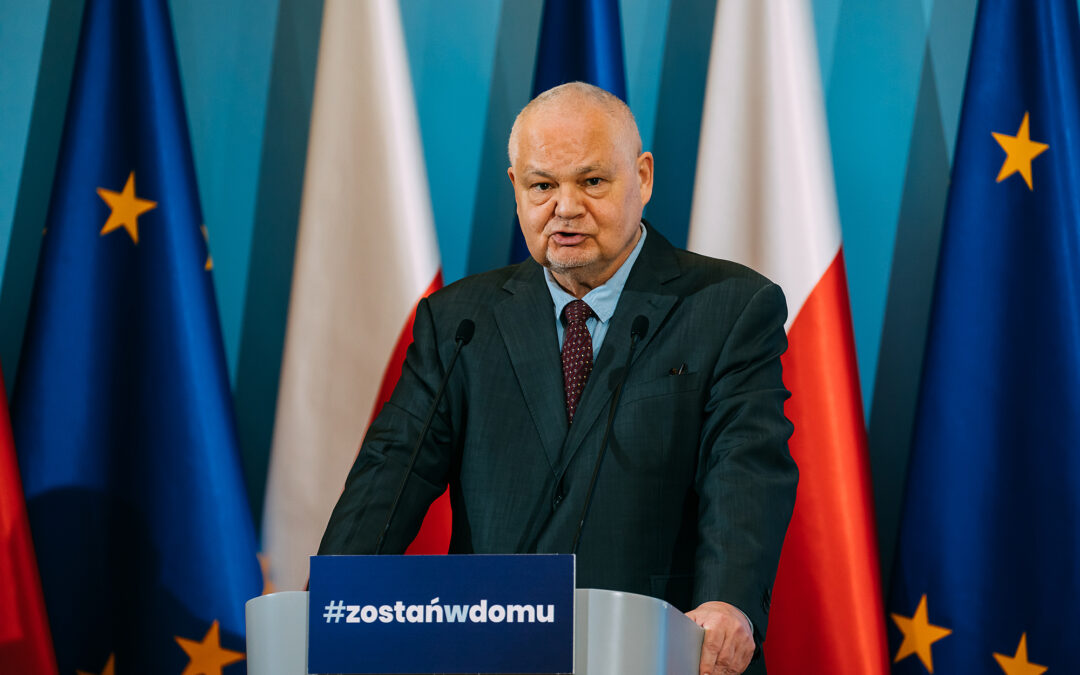Poland’s president, Andrzej Duda, has nominated the governor of the National Bank of Poland (NBP), Adam Glapiński, for a second term, praising his actions to limit the economic effects of the COVID-19 pandemic.
Critics, however, have accused the central bank chief of incompetence, in particular for failing to take early and decisive enough action in response to inflation, which has soared to its highest level in over two decades and is among the highest in Europe.
Prezydent wnioskuje o powołanie Glapińskiego na drugą kadencję w roli prezesa NBP – Szrot, KPRP https://t.co/2qRTFjRNvU pic.twitter.com/69xzUspgf6
— PAP Biznes (@PAPBiznes) January 29, 2022
Glapiński – who is a longstanding associate of Jarosław Kaczyński, the chairman of Poland’s ruling Law and Justice (PiS) party – sees his six-year term come to an end on 21 June. He has previously stated his interest in undertaking a second term, which would also be his last under current rules.
Speaking to the Polish Press Agency (PAP) on Saturday, the president’s chief of staff, Paweł Szrot, revealed that Duda has now nominated Glapiński for a second term by sending a motion to the speaker of the Sejm, the lower house of parliament.
“The president positively assesses the actions of Governor Glapiński, which were aimed at limiting the economic effects of the epidemic,” said Szrot. Glapiński’s candidacy will now need the support of the Sejm, where PiS commands a narrow but unstable majority.
The nomination does not come as a surprise, given Duda’s praise of the governor’s stewardship of the bank in recent months. In November, Glapiński received the Economic Award of the President of the Republic of Poland, a prize invented for the occasion.
However, the domestic political opposition and some international observers have been less charitable to the Polish banker’s performance.
In the same month as he received Duda’s award, Glapiński was rated as the joint-worst central banker of 16 major European economies by New York-based Global Finance magazine.
The authors noted that Glapiński has “taken a surprisingly relaxed wait-and-see stance” in response to soaring inflation, which reached 8.6% in December, its highest level in 21 years.
Poland’s inflation figures have long surpassed the NBP’s target of 2.5% (allowing for a one-percentage-point deviation) and have consistently been among the highest in the EU for two years.
While Glapiński had long downplayed the need to raise interest rates in response, the NBP then unexpectedly did so in October and has since brought them up to 2.25% in four consecutive increases.
Earlier this month, Glapiński responded to criticism by saying that, as the NBP’s head, he had pledged to “strive for the economic development of his motherland and the prosperity of its citizens,” which did not “only” include fighting inflation, and certainly “not at all costs,” reported PAP.
The opposition has also called for Glapiński to step down after a term of “catastrophes, incompetence and very ambiguous behaviour”, in the words of Donald Tusk. The Civic Platform (PO) leader argues that Glapiński has only kept his current position due to being a “close friend” of Kaczyński.
Last year, Glapiński also raised eyebrows by suggesting the introduction of a 1,000 zloty note to make it easier for the NBP to store its cash reserves as well as for people to keep money in “underwear drawers” at home.
He previously oversaw the introduction of Poland’s current highest-value note, 500 zloty, in 2017, bucking an international trend for countries to move away from high-denomination notes, which can facilitate money laundering and other forms of crime.
Poland’s central bank is releasing a banknote featuring late president Lech Kaczyński, the identical twin brother of current ruling party chairman Jarosław Kaczyński.
"We want to pay tribute to a great man," says the head of the bank https://t.co/I1IgAu39CO
— Notes from Poland 🇵🇱 (@notesfrompoland) October 18, 2021
Main image credit: Krystian Maj/KPRM (under CC BY-NC-ND 2.0)

Maria Wilczek is deputy editor of Notes from Poland. She is a regular writer for The Times, The Economist and Al Jazeera English, and has also featured in Foreign Policy, Politico Europe, The Spectator and Gazeta Wyborcza.




















